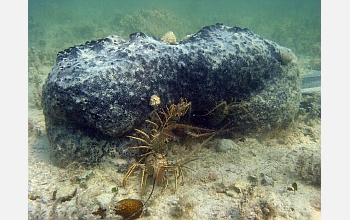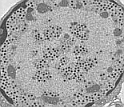|

Press Release 06-090
Lobsters Avoid Virus by Detecting Illness in Their Own Kind

Healthy animals shun sick ones
May 24, 2006
Caribbean spiny lobsters are able to detect illness in others of their kind, and employ avoidance tactics to keep their population healthy, according to a paper in this week's issue of the journal Nature.
The research results show that the usually social animals avoid contact with other lobsters that carry viruses--even before those lobsters become infectious.
"Pathogens that can be transmitted from animal to animal are a major threat to their populations, especially in animals that are social," said Chuck Lydeard, program director in the National Science Foundation (NSF)'s Division of Environmental Biology, which funded the research. "This is the first record of social animals avoiding diseased individuals of their own species in the wild."
Donald Behringer and Mark Butler of Old Dominion University in Norfolk, Va., and Jeffrey Shields of the Virginia Institute of Marine Science in Gloucester Point, Va., studied young Caribbean spiny lobsters, some of which were infected by a virus transmitted by physical contact and, among the smallest lobsters, via sea water.
"Spiny lobsters are social and share communal dens, so these modes of viral transmission would have devastating consequences if there were no mechanism to check its spread," the scientists wrote.
But a mechanism there is: healthy lobsters avoid close contact with sick ones. "Healthy lobsters, when choosing dens, don't move in with those infected by this virus," said Butler.
"This avoidance tactic could be the reason for the limited transmission of the disease among natural populations in the wild," said Behringer.
The virus, called PaV1, or Panulirus argus virus 1, "infects several types of tissues," said Shields, "primarily in juvenile lobsters, resulting in metabolic wasting and death."
The research showed that healthy lobsters steer clear of infected individuals even before they show disease symptoms. "We don't yet know how this early detection of infected individuals happens," said Butler.
-NSF-

Media Contacts
Cheryl Dybas, NSF (703) 292-7734 cdybas@nsf.gov

The National Science Foundation (NSF) is an independent federal agency that supports fundamental research and education across all fields of science and engineering. In fiscal year (FY) 2009, its budget is $9.5 billion, which includes $3.0 billion provided through the American Recovery and Reinvestment Act. NSF funds reach all 50 states through grants to over 1,900 universities and institutions. Each year, NSF receives about 44,400 competitive requests for funding, and makes over 11,500 new funding awards. NSF also awards over $400 million in professional and service contracts yearly.
 Get News Updates by Email Get News Updates by Email
Useful NSF Web Sites:
NSF Home Page: http://www.nsf.gov
NSF News: http://www.nsf.gov/news/
For the News Media: http://www.nsf.gov/news/newsroom.jsp
Science and Engineering Statistics: http://www.nsf.gov/statistics/
Awards Searches: http://www.nsf.gov/awardsearch/
| 


